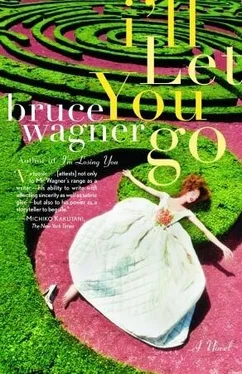“How could it be legal to fake your death?”
“It is if you don’t rip anyone off. Then there’s this ensemble piece I’m thinking of, about a bunch of despots — you know, from imaginary countries — living on a wealthy street in London. They’re all neighbors, kind of an outcast’s Notting Hill . So-called kings who looted their treasuries and tortured people. Idi Amin and Papa Doc types. That could be for HBO. I’d love to create a Sopranos , but the dictator thing might be too harsh.” Pullman hobbled out of the room in disgust. “Oh! And I want to do a comedy about a girl who’s a ‘G.T.A.’—know what that stands for? Genital Teaching Associate. That’s a model who teaches pelvic-exam techniques to med students. I’m serious, Tull, that job actually exists ! Ya gotta learn some where, baby, I am telling you — it’s like I’ve been freed: my mind’s completely opened up. When I look at those ‘Rafe’ scripts I wrote, it’s like holding third-rate artifacts from another time. And I owe it all to Ron Bass!”
Let us pick up from where we left Katrina.
She is wearing a sixties Lanvin python jacket and Miguel Adrover chain-mesh halter top; setting off seriously green eyes is a multicolored pearl necklace bought at Piranesi, in Aspen, a few years back, for a quarter-million. She sets aside her Colonne excavations, nostalgically distracted by her father’s collection of photographs.
The familiar images erupt, shuffled out of sync, a mess of time: Bluey, in ’51, at Count Carlos (Charles) de Beistegui’s costume ball at the Palais Labia on the Grand Canal, the Venetian summer before she met Louis. Cecil Beaton took the picture: her friend Daisy Fellowes came as Marie-Antoinette, and Bluey went as lady-in-waiting, dressed like a milkmaid — they stood with the count, sweetly absurd in his sausage-curl wig. A half-dozen years later: Bluey standing with her dapper, slightly intimidated husband in the downstairs gallery of Peggy Guggenheim’s astonishing palazzo among the astonishing Pollocks. Her mother first met Merce Cunningham there — and André Breton, who Trinnie later learned had been obsessed with “the Broken Column” himself, camping with the Surrealists at the Désert de Retz. A snapshot of her father in Guam, 1945; another of Louis pointing to the pig tattoo on a sailor’s foot (he told her the popular mariner’s notion that, like David Copperfield’s caul, the mark could prevent one from drowning); again Louis, on the terrace of a Fifth Avenue penthouse showing off his Bronze Star; at the Paley wedding; then both parents, years later, with the Paleys and Cushing sisters at Round Hill. Summertime clambakes in Nantucket; messing around at Bouldereign (Carefree, Arizona); Jamaica and New Orleans; with Valentino and the Buckleys in Gstaad, and Carol Burnett at Snowmass; grinning madly at the Malaparte cliffhouse in Capri; with Jackie Gleason and Oona O’Neil at Villa Nirvana, Las Brisas … Palm Springs with the Nixons and Annenbergs; a hoedown at the deMenils’; Bluey in someplace like Laguna with a handsome man Trinnie had always suspected to be a lover; Louis and Bluey at their own wedding in Palm Beach. Then — standing on the pontoons of a seaplane on the lake outside their Adirondacks Great Camp, arms raised in a toast; Louis in his duds on digging machines in front of various yawning, mile-wide quarry pits; Louis during somber late-life travels to far-flung graveyards. Then came the kids: blurry black-and-whites of Dodd and Katrina behind nursery glass, haunting, smudgy little faces, swollen post-natal eyes and bundled bodies held aloft by smily-eyed, half-masked attendants for all the world to see.
Beverly Hills. The kids with new Schwinns. The kids at Point Dume. The kids in water-hose sword fights with Liz Taylor’s sons in the driveway of the house on Roxbury, overlooked by a scowling, very much younger Winter. The kids in the back of the Corniche at Dolores’s Drivein, hamburgers already transferred to mahogany seat trays. Dodd, age thirteen, at the Beverly Vista graduation, standing in front of the orange-brick wall of the inner court like a prisoner about to be executed. A photo of the ten-year-old Tull riding Pullman had snuck in …
She stole another look at Bluey in Venice and thought, Her life has been full. Still, it distressed her to already be eulogizing.
Her eyes grew tired. She felt a hard frame beneath the remaining fan of images and pulled it out — a quote from the embattled founder of the William Morris Agency, clipped from a 1909 Variety . Marcus used to keep it on his desk at work.
I will be William Morris forever. And if I must lose the business I have cherished, so be it. I would rather be William Morris and have my home and three meals a day and leave my name to my son—
Stuck to its underside for no rhyme or reason was the Kodak she had taken (her heart skipped a beat) of the benighted Désert de Retz on the day of their long-ago trespass. A chill came over her — she hadn’t seen a photo of her Marcus in so long. He stood in the foreground of the meadowy depression, the cracked alabaster skin of the castle rising from his shoulders to crown him.
Finally, Trinnie saw the thing for what it was: the megalithic woman he’d left her for. She’d never had a chance.
She heard something and looked up — it was her son. He walked toward her through the vestibule of the great room, small steps over a floor made of 57,000 hand-carved pieces of mahogany, ebony and tulip-wood, past draperies tied with leg-of-mutton passementerie, circumnavigating his grandfather’s cemetery of beloved architectural models, slowing regally as he reached a grove of Chinese porcelain birds on giltwood brackets, and Fragonards resting upon a Pluvinet canapé covered in horsehair. His mother had by then tucked away the portfolio and greeted him with a smile.
He thought her ostentatiously dressed, and that concerned him; it usually presaged a leave-taking or breakdown. “What are you doing?”
“Some research.”
“For the hospital garden?”
“Yes.”
“How’s it going?”
“Well.”
“How’s Bluey?”
“Not so well.”
“How are you?”
“Couldn’t be better.”
“Can I talk?”
“Yes, you can talk!”
“It’s about my father. I found out a few things.”
“Such as?”
“That he was an agent. And that he worked at William Morris.”
“You talked to your grandfather …”
“No. I just — I found out myself.”
“I could have told you that. It wasn’t a big secret.”
“ Everything’s a secret,” he reprimanded. “Anyhow, I wouldn’t have asked.”
“Why not?”
He lowered his eyes, wanting respect conferred upon his discretions. “But I do want to ask some things now.”
“Ask away.”
“Who was he an agent for? Actors?”
“Actors, directors, writers. He had them all.”
“How did you meet him?”
“A party. At the home of a man named Ed Limato.” She smiled; it had been years since she’d said that name. “Everyone went to those parties — they were great fun. I wanted to be an actress, or thought I did. For about a week.”
“He was your agent?”
“No.”
“If I mention something, will you not ask me how I found out?” She nodded. “Because I gave certain people my word.” She nodded. “Do you — do you know anything about him — about Marcus — stealing a book?”
“Yes.” Then: “They never brought charges.”
“Because the store was reimbursed by the detective.”
“You’re good. You are very good.”
She lit an American Spirit, inhaling the smoke like a native.
“I thought you stopped.”
Читать дальше












